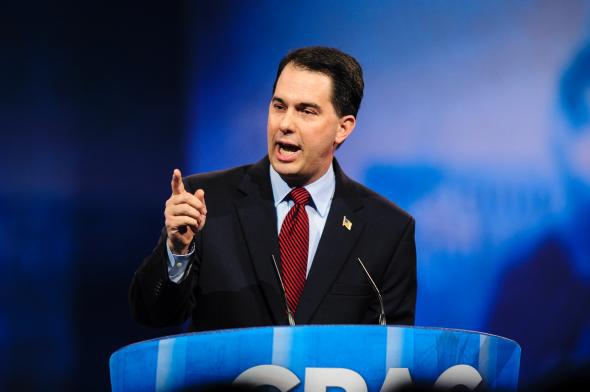David Koch went out of his way on Tuesday to make it clear that he and his brother haven’t made up their minds on which Republican they want to see in the White House in 2016—but Charles Koch wasted little time reminding the conservatives desperate to win their favor that they’re keeping a short list and checking it twice.
In an interview with USA Today, Charles ticked off five GOP hopefuls who he said had both a general message he and his brother agree with and a “good chance of getting elected”: Wisconsin Gov. Scott Walker, former Florida Gov. Jeb Bush, Texas Sen. Ted Cruz, Kentucky Sen. Rand Paul, and Florida Sen. Marco Rubio. “Those are the ones we have talked to the most and who seem to be the possible leaders,” Charles told the paper in an interview that was published late Tuesday, one day after his brother David scrambled to downplay his recent comments that appeared to suggest that he had settled on Walker as his candidate of choice.
Charles’ remarks seem to confirm the general consensus about which candidates make up the top tier in the so-called Koch Primary. Earlier this week Politico reported that the brothers had sent invitations to five GOP hopefuls—the same five Charles mentioned—to appear at their next summit of those deep-pocketed donors who have helped the Kochs make their dark-money political machine a force on par with the Republican National Committee. Their last such gathering—held in January—featured Walker, Cruz, Paul, and Rubio. Bush reportedly had been invited but had to pass because of a scheduling conflict.
It’s no mere coincidence that the five candidates Charles chose to name-drop are also the top five names in national polls. As I explained earlier this year, the Kochs have no real reason to pick from among the favorites when we’re still so far away from the first nominating contest. For starters, their network isn’t quite as monolithic as it might first appear. It is believed to include several hundred donors, who presumably share a disdain for big government but don’t necessarily agree on which candidate will be the best vehicle for that worldview. And even the brothers themselves have slightly different tastes when it comes to picking favorites.
But more importantly, the brothers know they can get more bang for their obscenely large amount of bucks the longer they wait to deploy them. In the meantime, the simple potential of their forthcoming shock-and-awe campaign means that any candidate hoping to secure their financial support (or just avoid being the target of it) will have to align their own policy views with those of the Kochs—at least on the issues the brothers are the most serious about (i.e., not criminal justice reform).
“We’re telling them that if they want our support,” Charles said about those on his short list, “one way to get it is articulating a good message to help Americans get a better understanding and a better appreciation of how certain policies … will benefit them and will benefit all America.” Translation: Convince the people to agree with our positions.
